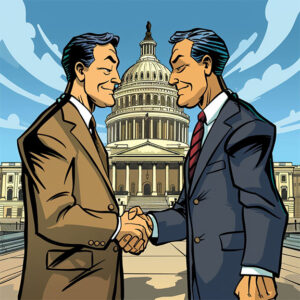 In the United States, the left seems to dominate comedy. Comedians like Seth Myers and shows like The Daily Show are clearly left leaning, although they do mock Democrats and leftists. While there are conservative comedians, the big names, such as Jeff Foxworthy, usually avoid ideological comedy and are more likely to comment on red necks rather than red state politics. Conservative comedians who engage in ideological comedy tend to fare poorly in the mainstream, leading to the conclusion that conservative comedians can be good at comedy but that conservative comedy, so far, is not good. That said, conservative comedy is seen as good by those who like it, which leads into the classic aesthetic debates about objectivity and subjectivity. But I will focus on the apparent failure of conservative comedy as comedy.
In the United States, the left seems to dominate comedy. Comedians like Seth Myers and shows like The Daily Show are clearly left leaning, although they do mock Democrats and leftists. While there are conservative comedians, the big names, such as Jeff Foxworthy, usually avoid ideological comedy and are more likely to comment on red necks rather than red state politics. Conservative comedians who engage in ideological comedy tend to fare poorly in the mainstream, leading to the conclusion that conservative comedians can be good at comedy but that conservative comedy, so far, is not good. That said, conservative comedy is seen as good by those who like it, which leads into the classic aesthetic debates about objectivity and subjectivity. But I will focus on the apparent failure of conservative comedy as comedy.
Smug liberals might claim good comedy requires intelligence and conservatives are less intelligent than liberals. Conservatives might counter that stupid liberals are amused by stupid liberal jokes and fail to appreciate the brilliance of conservative comedy. One concern is that this issue of who is more intelligent is an ideological fight, and this raises the question of unconscious bias on the part of researchers and concerns about methodology. But even if liberals are, in general, somewhat more intelligent than conservatives, this would not adequately explain the apparent disparity in the quality of comedy.
An alternative explanation is that there is a psychological difference. The same traits that draw a person to liberalism would also make a person more proficient at comedy. In contrast, the traits that draw a person to conservatism would make them less capable at comedy. What, then, are these traits and how might they impact comedic competence?
Conservatives, by definition, want to preserve the existing social order and tend to have favorable view of traditional social institutions. Liberals tend to be more willing to change the social order and are less inclined to take tradition as a justification for institutions and practices. As political comedy often involves making fun of the existing social order and mocking traditional institutions, this would help explain why conservative comedians would be less inclined to engage in this sort of comedy.
But while conservative comedians might shy away from making fun of conservative targets, there is still a target rich environment. There are many liberal targets ideally suited for conservative comedy. In fact, liberal comedians already mock many of these targets, such as Joe Biden.
Conservatives do mock institutions and social orders they see as tainted by the left. Trump, for example, has been attacking the justice system. However, this mockery tends to be more of an attack than comedic in nature. While some see Trump as a clown, he is not a comedian. Given the abundance of targets and the willingness of conservatives to go after them, it is something of a mystery why this rich ecological niche of liberal mocking has not been filled with successful comedy from the perspective of the right.
One explanation could be a variation of the victim narrative conservatives usually reject when used by the left. The left often explains, for example, why women or minorities are underrepresented in an area in terms of oppression and victims of oppression. Conservatives could claim that comedy is dominated by liberals, and they are using their power oppress conservative comedians. If only conservative comics were given a chance, perhaps in the form of some comedic affirmative action, then they could succeed with their conservative comedy.
This explanation could, ironically, be countered by the usual conservative response to claims about oppression, such as the failure of the allegedly oppressed being due to their own inferiority, to deny the alleged disparity or advance the bootstrap argument. While this approach might be satisfying, it is worth considering that conservative comedians are the victims of oppression, that their voices are being silenced by the powerful, and that they are victims. The dearth of conservative comedians, like the dearth of minorities in the highest positions in society, is consistent with injustice. If conservative comedians are being unjustly oppressed, then steps should be taken to address this, perhaps beginning with a comedic affirmative action program to help them get established in the face of a system that has long been stacked against them. Assuming they want to be comedians.
It also worth considering whether conservatives want to be comedians. As with some other cases of alleged oppression, perhaps there are few, if any, conservative comedians because few, if any, conservatives want to be comedians. If this is the case, then there is no oppression to address, and things are as they should be. This is what, of course, conservatives often say about the alleged oppression of others.
Another possible explanation for the failure of conservative comedy lies in comedy itself, at least as defined by our good dead friend Aristotle. As Aristotle saw it, comedy “is a subdivision of the ugly” and “consists in some defect or ugliness which is not painful or destructive.” Political comedy often involves mocking targets across the lines of power, because politics is largely about power relationships. Liberal comedy typically involves mocking up the hierarchy from below. For example, female comedians making fun of the patriarchy is mockery aimed upwards. As the mockery is directed upwards, it generally will not be painful or destructive. This is because the advantages of power are possessed by the target and not the comedian.
Since conservatives tend to support existing power structures and established social values, the target of conservative comedy tends to be people and organizations outside of those structures or who have different values. As such, conservative comedy would tend to be aimed down the power curve: people in stronger positions going after weaker targets. For example, a white comedian mocking Black Lives Matter is mocking downward from an advantageous social position. A straight comedian mocking trans people is also mocking downward. These are general claims and there can be cases in which a specific conservative comedian might be mocking upward. To use an obvious example, a conservative comedian mocking Biden would be mocking upward because of the disparity between them and the powers of the President. Matters can, of course, get complicated. While Biden is President, he is also old and being in this category puts him at a comedic disadvantage in our society.
While comedy can be aimed downward and still be comedy, this is challenging because such attempts can easily become painful or destructive, thus ceasing to be comedy. Trump provides an excellent example of this. While he often claims to just be joking, his enormous power advantage means that he is almost always punching downwards and thus appears bullying and cruel rather than comedic. As another example, the Daily Wire’s Lady Ballers is an attempt at comedy that has been largely unsuccessful. While this is for a variety of aesthetic reasons, punching down at transpeople from a position of social dominance seems cruel. But this sort of comedy can be successful with those who share the ideology of the comedians—but this seems to be more a matter of enjoying the ideology rather than the comedy.
This, I think, is a plausible explanation for the dearth of good conservative comedy. As conservatives, they are not inclined to punch up or mock the traditional hierarchy. But if they punch down, this tends to be cruel and ugly and thus unlikely to be comedy. But there can be niche for conservative comedy—they could punch up at powerful liberal targets while avoiding also punching down. For example, mocking a powerful liberal woman, like Clinton, without resorting to misogyny. Or mocking Obama without engaging in racism. But this is what liberal leaning comics already do, so perhaps conservative comedy simply cannot be good because of the nature of conservatism.

 Another criticism of teachers’ unions is that they spend millions of dollars lobbying politicians to protect and advance their interests. This is bad, or so the reasoning goes, because the interests of the teachers’ unions are often (or perhaps even always) contrary to what is best for students.
Another criticism of teachers’ unions is that they spend millions of dollars lobbying politicians to protect and advance their interests. This is bad, or so the reasoning goes, because the interests of the teachers’ unions are often (or perhaps even always) contrary to what is best for students.